| Reviews & Columns |
|
Reviews DVD TV on DVD Blu-ray 4K UHD International DVDs In Theaters Reviews by Studio Video Games Features Collector Series DVDs Easter Egg Database Interviews DVD Talk Radio Feature Articles Columns Anime Talk DVD Savant Horror DVDs The M.O.D. Squad Art House HD Talk Silent DVD
|
DVD Talk Forum |
|
|
| Resources |
|
DVD Price Search Customer Service #'s RCE Info Links |
|
Columns
|
|
|
Lieutenant: The Complete Series, Part 1 (Warner Archive Coll.), The
Impressive, little-seen drama from pre-Star Trek producer Gene Roddenberry. Warner Bros.' M.O.D. (manufactured on demand) service, the Archive Collection, catering to movie and TV buffs looking for those hard-to-find library and cult titles, has released The Lieutenant: The Complete Series, Part 1, a 4-disc, 16-episode collection representing the first half of the NBC drama's 1963-1964 season (I'll be reviewing the second volume later this week). Sporting an intriguing backdrop for an episodic drama―life at "peacetime" Marine Corps Base Camp Pendleton in San Diego, California―The Lieutenant, starring Gary Lockwood and Robert Vaughn, only lasted a year against powerhouse Jackie Gleason on Saturday nights before it was canceled. However, judging by the quality of the scripts for this first half of the season, it's a pity this fine, unusual drama anthology didn't complete a full tour. No extras in this volume, but the black and white transfers are razor-sharp excellent.
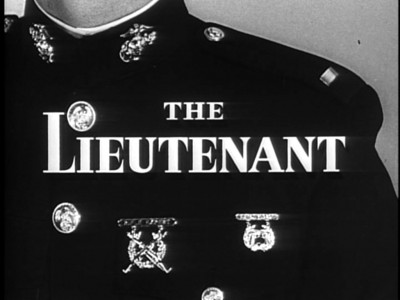
The United States of America, 1963. Marine Corps Base Camp Pendleton in San Diego, California. Second Lieutenant William Tiberius Rice (Gary Lockwood), a recent graduate of the United States Naval Academy at Annapolis and officer's training school at Marine Corps Base Quantico, now finds himself in charge of a rifle platoon out of Bravo Company. His immediate superior is Company Commander Captain Raymond Rambridge (Robert Vaughn), an icily-competent officer and veteran of the Korean Conflict who only demands one thing from his men: absolute adherence to the book. The reason for this rigidity? Marines are the first to fight, and without warning, the men under Rambridge's and Rice's command could be flying or sailing into harm's way, with only their extensive training and strict discipline standing between survival and dying on a foreign shore. 2nd Lt. Rice may live off-base in a swinging beachside apartment, with his fair share of out-of-uniform off-duty hours, free to pursue a variety of pretty women. However, at any moment, the alert siren could sound, signaling his return to base...and possibly a call to arms.
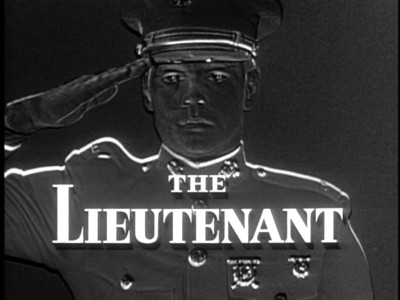
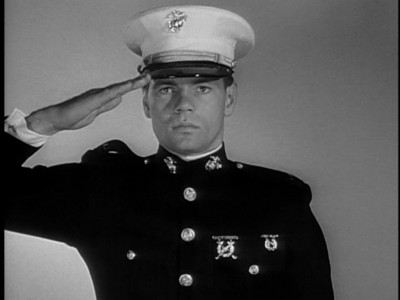
Often mentioned (but usually only in passing) whenever Star Trek creator Gene Roddenberry's television career is detailed, The Lieutenant has been a decades-long elusive, tantalizing "must see" for hard-core fans of the producer's work. The Lieutenant's unsuccessful single season in 1963-1964 effectively eliminated any chance at syndication reruns, so I would imagine the majority of Roddenberry fans haven't seen this yet...if the majority is even interested in seeking it out (if The Lieutenant had a sci-fi angle, fan demand that craves anything even remotely connected to Star Trek would have instigated a release years ago). I grew up watching reruns of Star Trek religiously every afternoon, year after year, but with that said, I'm no expert on the show and certainly not on Roddenberry. So I didn't come to The Lieutenant looking for connections or shared themes or motifs that cross over into Federation territory. I approached these 16 episodes within the context of late 50s early 60s network adventure dramas (and quasi anthologies) like Route 66 or The Fugitive or Gunsmoke―indeed much like the shows Roddenberry wrote for at the start of his career: Highway Patrol and Have Gun, Will Travel. And within those parameters, The Lieutenant fared quite well.
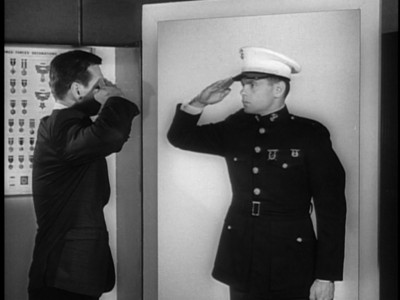
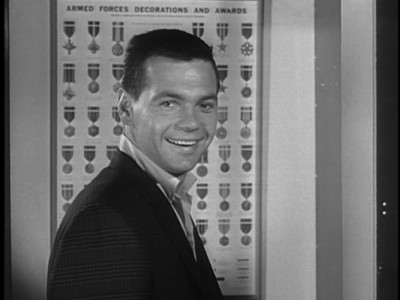
In 1963, when The Lieutenant premiered, comedy was king in the network ratings (fully half of the Top 30 Nielsen programs were comedies), with quiz and variety shows coming in second (8 in the top 30). Of course, straight drama was still popular, but more often than not it was slotted and couched into other genre frameworks: Westerns (Bonanza, The Virginian), kiddie shows (Lassie), medical dramas (Dr. Kildare), mysteries (Perry Mason), and action/adventure shows (The Fugitive). The Lieutenant's hook was that it told stories framed by a contemporary military experience, unlike rising hit Combat!, which was set during WWII, and not unlike police procedurals such as Dragnet that gave the viewer a glimpse of the inner workings of an unfamiliar environment inbetween the action and dialogue. One assumes the producers received full cooperation from the Marines, considering the extensive on-location shooting at Pendleton, as well as all the authentic hardware and uniforms; it's a little unnerving, though, seeing the real recruits in some of the footage―one wonders how many of them would soon be shipped off to Vietnam (and it's important to note that with cooperation no doubt came script approval from the D.O.D.).
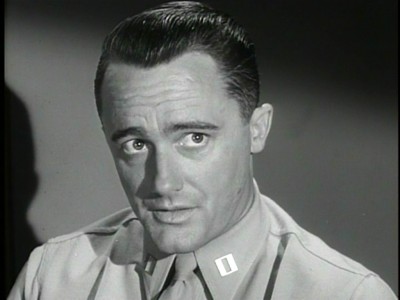
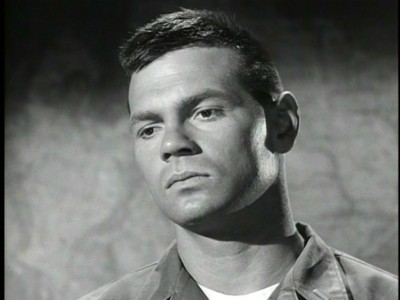
I've always had this little pet theory―completely unsubstantiated―that how appealing a title or credit sequence comes off, is somehow linked to how popular the TV series is with the public: look at Alfred Hitchcock, or Gilligan's little theme song, or Mannix's split-screen titles. The Lieutenant's title sequence is initially quite intriguing. They start with a reverse, negative image of Lockwood in his uniform, which corrects itself, before Lockwood dressed as a civilian salutes his Marine-uniformed image in a mirror. It's a nice metaphor for the show: who is he? Bill Rice, a questioning young man...or 2nd Lt. William Tiberius Rice, rigid, proud Marine officer? However...the producers completely blow this interesting little visual by then having Lockwood look directly into the camera and pull a goofy little smile. What is this: Gomer Pyle? (...which was nothing more than The Lieutenant minus the drama and way-plus with the corn and slapstick). It's an unnerving jar every time it pops up, particularly when The Lieutenant (at least during these first 16 episodes) is about as far away from a sitcom as you can get.
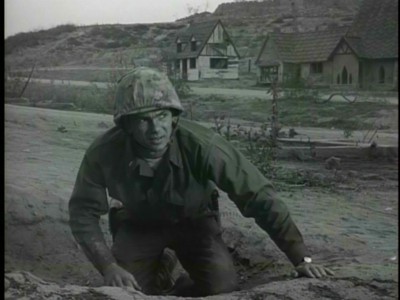
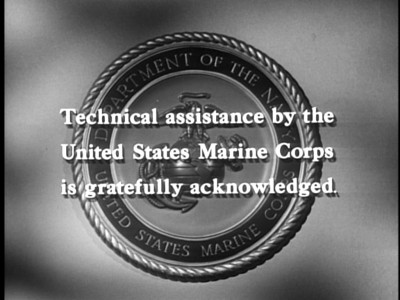
If you're primarily a Star Trek/Roddenberry fan, and you haven't seen too much straight drama from that time period, you might be tempted to declare The Lieutenant "groundbreaking" in the mature themes it tackles. However, that kind of startled recognition of how good television used to be usually only comes to newer viewers who have read and been told that 50s and 60s TV was a "vast wasteland" of inane, soulless products calculated to "merely" entertain and sell soap. Of course that's elitist, ill-informed nonsense, and The Lieutenant is a good refutation of that commonly held misconception. As with any good episodic or quasi-anthology drama, the framework is key. In Route 66 and The Fugitive, the enforced "wandering" of the lead characters enabled the writers to cross their paths with a multitude of interesting strangers with interesting stories. With The Lieutenant, the peace-time military base setting proves supple-enough to accommodate both action-oriented set-pieces (like all those chase scenes in The Fugitive and fistfights in Route 66) and more intimate, personal drama.
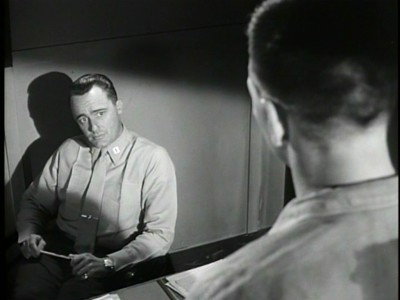
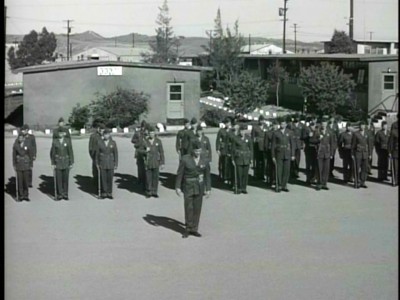
And with that military framework, it's not surprising that the majority of the stories (at least for these first 16 episodes) focus on a few recognizable themes involving life in the service. Masculinity, and what that means, is a recurrent concern. The season opener, A Million Miles from Clary, stars a perfectly-cast Bill Bixby as a flashy, obnoxious goldbrick who hasn't, as his father, Russell Thorson fears, "grown up." For these first 16 episodes, the producers and writers of The Lieutenant make no bones about celebrating military service as a high calling, deserving of men who will meet its challenges, both physical and ethical (that should get a few yelps from the lefty whelps today...). Bixby is shown as a worthless baby who cries when he's hurt (Lockwood looks disgusted with him); it's only when he's forced to accept the structure of the military is he deemed finally suitable for redemption and maturation. In To Take Up Serpents, Rice must conquer his own fear of flying, which he does through a soul-searching trip to both the flight surgeon (science) and the chaplain (religion), finding solace and courage in the latter (uh oh...here come the emails). Screenwriter Jay Sims, who pens a few episodes this season, has the last laugh when Rice finds out what made him so sick every time he went up: a 24-hour stomach bug.
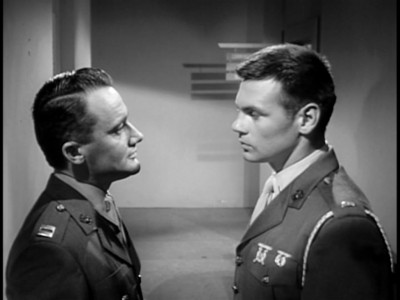
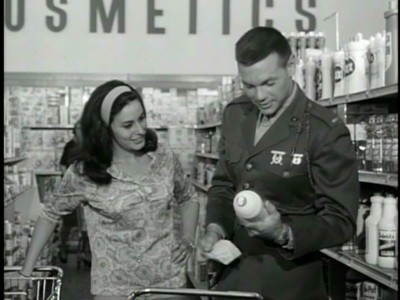
With the producers creating the neat trick of having Rice be both new at his job and yet still in command of lower-ranked men, the writers can meditate on the state of discipline in the service, or more to the point: the constant fear that an officer will lose control of his men. In A Million Miles from Clary, Rice's gunny tells him to be careful: if the men feel he's playing favorites with one man, discipline will disappear and disobedience will grow like an infection. The Art of Discipline takes that notion even further, when Rice makes the mistake of trying out democracy within the ranks, letting everyone have a say in how the platoon is run, right down to how the men are supposed to act during drills and maneuvers (John Considine is nicely cast as a college-educated snob who hates authority and who thinks the military should be run by the soldiers, not officers). Of course, Vaughn catches wind of this "peculiar odor" of the "community drive," as he puts it, launching into a blistering rebuttal of Lockwood's new order by laying it out straight: "combat is insanity" to most recruits, and without the discipline to follow orders quickly, more men than should will die (...although no man could survive the onslaught of Considine's sister Anne Helm's twin Howitzers, as she futilely tries to restrain them when her bikini top comes off). According to what I've read, Gene Roddenberry was a bona fide hero during WWII, flying many combat missions and earning several prestigious medals. He also served for seven years as a L.A. cop. I wonder if those experiences translated into The Lieutenant's rock-steady endorsement of a top-down, authoritative structure through which a man can find experiences that challenge and ultimately deepen his personal maturation?
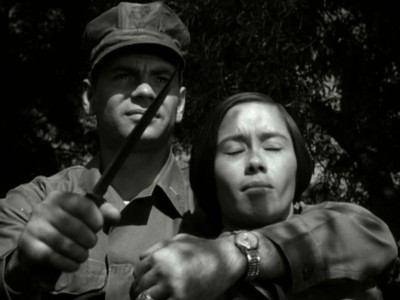
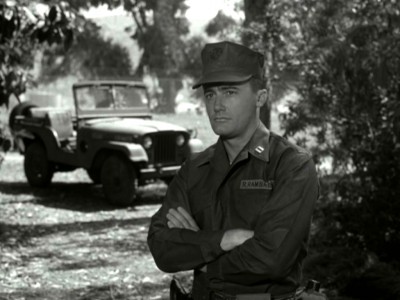
The harrowing physical and emotional environment of the military is the most consistently displayed theme here in these first 16 episodes. In A Very Private Affair (with a script by Roddenberry for what I assume is the original pilot for the series), Roddenberry makes sure to show how cool it is to be a Marine off duty (lots of bikini babes at Rice's new beachside apartment building), only to pull the rug out from the viewer by showing the turmoil extended leaves from home have on married couples, as well as illustrating how much more hotshot Rice has to learn to become even competent in his job (Roddenberry makes sure that Rice fits the network bill for "Everyman soldier" here, circa 1963 America: "Religion, Protestant. Politics, independent."). In The Proud and the Angry, 14-year veteran and Korean War hero Rip Torn isn't a hero at home; his wife is angry he didn't take a cushier desk job so he can be home more with her and their children. He counters that someone has to teach these new recruits how to survive in combat situations, and he has the skills to do so (importantly, all accusations of his supposed "brutality" against the recruits―the central storyline here―are proven false at the end). In Fall From a White Horse, Vaughn upbraids a tentative, unsure Lockwood for thinking of quitting when Lockwood is asked by Andrew Prine to serve as his counsel in a court martial proceeding; Vaughn tells Lockwood there's a certain special quality called "leadership" that men discover once they reach down and find a reserve of competency when they're positive there is none. In Captain Thomson, an angry, violent Paul Burke, a passed-over-for-promotion guerrilla fighter back from Southeast Asia, can't compromise with the homefront demands of his job―paperwork, more measured responses to his men and superiors―so it's only when Vaughn "breaks him" by offering a promotion in Supply does Burke learn that the modern military is about subjugation of the individual to the system―not an individual going his own way...no matter how great a fighter he is in the field. And in the remarkable Alert!, scripted by Lee Erwin and directed by Don Taylor, Lockwood grows increasingly worried that the full-scale alert they're on―complete with overseas flight―will lead to action. Worse, he's allowed a soldier to have a small hope he could stay behind with his pregnant wife, even though Lockwood knew that soldier was the best man to lead his squad. Vaughn lays it out why Lockwood can't allow such sentiment to interfere with duty, particularly crushingly boring peacetime duty and routine: these Marines could be needed at a moment's notice (Charles McGraw has a terrific speech where he tells the recruits what combat is really like: not like the movies, where you die quick and clean...but with screams and chaos).
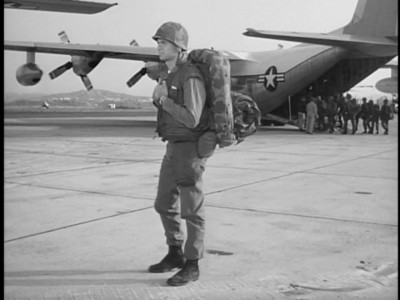
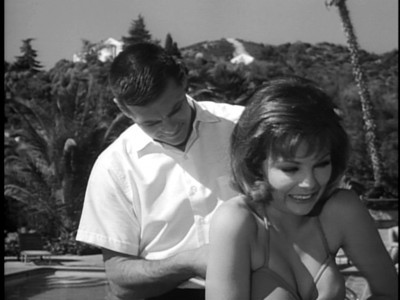
The notion of duty served to the country, and the emotionally complex situations that dedication can create, is also a frequent theme in The Lieutenant. In O'Rourke, retired Marine-now-author Eddie Albert (in a fierce, sensational turn) rages against the ravages of time as he realizes he can't cut it anymore as a hard-ass. In A Touching of Hands, scripted by Sy Solkowitz, the focus is on the wives of the men that serve. Ina Balin sympathetically plays the bored housewife of one of Lockwood's friends, who starts to think she could find solace in Lockwood's arms. The episode deftly illustrates the subtle pressures military life (and by extension, suburban housewife life) has on the women who stayed home...until Solkowitz jabs the unsuspecting viewer and has Lockwood skewer her "whining, rationalizing, and quitting" behavior. Lockwood points out she made a commitment for better or worse with her husband, and that she should check out the international news sometime to see what not-so-subtle pressures her husband faces everyday (the feminists are gonna love that one...). Further titillating modern viewers with its nods to oncoming troubles in Vietnam, A Troubled Image finds Lockwood providing commando training to French-speaking Asians from a "friendly government," including an absolutely gorgeous Pilar Seurat. Lockwood is dubious about her ability to fight, and Vaughn flat-out tells him it might be better to flunk her out, but he soon realizes she can cope...but only out of training, due to the psychological horrors she suffered at home. Once she's called to defend her own country, she'll do her duty (there's a fascinating end title card stating, "A Troubled Image is a fictional story." Was that put there by a nervous U.S. military?).
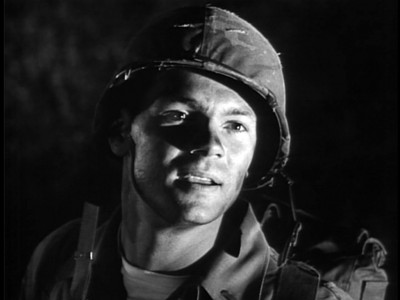
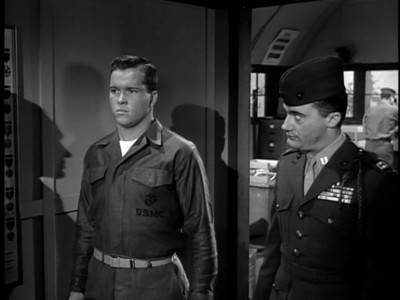
And in the fascinating Gone the Sun, scripted by Robert Dozier and directed by James Goldstone, Lockwood returns to his hometown of Clayton, Indiana on a grim mission: returning the body of a fellow soldier killed in a senseless accident during a training mission (Lockwood, a skilled, nuanced actor, is particularly good in this episode). At home, Lockwood encounters the boy's vengeful father (gravelly-voiced John Anderson was born to play these kinds of roles), his own peacenik father John Beal, who wrote an editorial in his newspaper about how the evil military killed young men needlessly (he'd get a job on any major newspaper today), and the "easy" Sherry Jackson who gives herself to Lockwood simply because he's honest enough to ask her for comfort during his tense stay. In today's liberal TV world, Lockwood's father's views would prevail, and the son would be made to heel to his father's morally "superior" viewpoint. However, in The Lieutenant, it's Lockwood's views that win out when he insists that yes, in a perfect world, there would be no need for a "cop on the beat"...but no such world exists (or ever will), a fact his father finally accepts. In the episode's final fade-out, Lockwood attends the funeral of the fallen soldier, and over his face, a title card quotes Rev. J.F. Clarke: "Conscience is the root of all courage; if a man would be brave let him obey his conscience." Of course what's fascinating about this is that in today's pop and media culture, "conscience" is a term overwhelmingly defined by the depths to which it sounds for pacifism. In The Lieutenant, Lockwood is lauded for following his conscience: as a warrior peacekeeper.
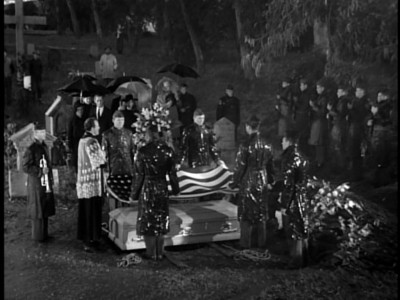
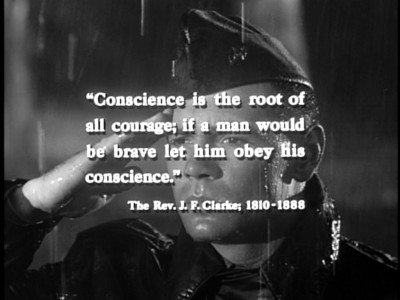
The DVD:
The Video:
The full-screen, 1.33:1 black and white transfer for The Lieutenant: The Complete Series, Part 1 looks terrific: mostly solid blacks that hold, a razor-sharp image, few if any blemishes, and no compression issues.
The Audio:
The Dolby Digital English mono audio track is clean, with low hiss and no subtitles or closed-captions available.
The Extras:
No extras in this first volume.
Final Thoughts:
First-rate drama with an intriguing backdrop. A relatively rare (for 1963) foray into contemporary straight drama, sans horses and six shooters and intelligent dogs and compassionate doctors and fugitives on the run, The Lieutenant excels in presenting emotionally complex storylines within an unfamiliar, fascinating environment: a peacetime homefront military base. Scripting, direction, and acting are all top-notch. A winner that, unfortunately, was dropped all too soon. I'm highly, highly recommending The Lieutenant: The Complete Series, Part 1.
Paul Mavis is an internationally published movie and television historian, a member of the Online Film Critics Society, and the author of The Espionage Filmography.


|
| Popular Reviews |
| Sponsored Links |
|
|
| Sponsored Links |
|
|
| Release List | Reviews | Shop | Newsletter | Forum | DVD Giveaways | Blu-Ray | Advertise |
|
Copyright 2024 DVDTalk.com All Rights Reserved. Legal Info, Privacy Policy, Terms of Use,
Manage Preferences,
Your Privacy Choices | |||||||













